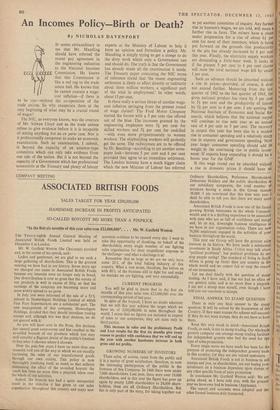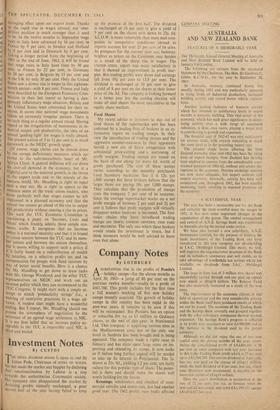An Incomes Policy—Birth or Death?
By NICHOLAS DAVENPORT The NIC, as everyone knows, was the creature of Mr. Selwyn Lloyd and as the trade unions refuse to give evidence before it it is incapable of stating anything but an ex park case. Nor is it professionally competent to make an economic examination. Such an examination, I submit, is beyond the capacity of an amateur-type committee which can only take evidence from one side of the nation. But it is not beyond the capacity of a Government which has professional economists at the Treasury and plenty of labour experts at the Ministry of Labour to help it form an opinion and formulate a policy. Mr. Maudling is simply trying to get a stooge to do the dirty work which only a Government can and should do. The truth is that the Government has already made all the examination it needs. The Treasury paper containing the NIC terms of reference stated that 'the recent engineering settlement is likely to affect directly or indirectly about three million workers, a significant part of the total in employment.' In other words, about 13 per cent.
Is there really a serious threat of another wage- cost inflation springing from the present round of wage claims? The Ford Motor Company started the furore with a 5 per cent rise offered out of the blue. The increases granted by the engineering employers were 5+ per cent for skilled workers and 5+ per cent for unskilled —with even more proportionately to women workers. The shipbuilding workers will probably get the same. The railwaymen are to be offered by Dr. Beeching—according to yet another news- paper leak—between 5 per cent and 6 per cent provided they• agree to an immediate settlement. The London busmen have a much bigger claim which the new Minister of Labour has referred to yet another committee of inquiry. Any further rise in busmen's wages, we are told, will mean a further rise in fares. The miners have a claim under preparation for a rise of about 6+ per cent for most of their members, which is being put forward on the grounds that productivity in the pits has already increased by 6 per cent this year. Finally, the electricity supply workers are demanding a forty-hour week. It looks as if the piesent 5 per cent to 6 per cent claims will raise the total national wage bill by under 1 per cent.
Such an advance should be absorbed without a rise in prices—provided, of course, it does not extend further. Measuring from the last quarter of 1962 to the last quarter of 1963, the gross national product has risen by 5' per cent to 51 per cent and the productivity of labour by 3-1 per cent to 4 per cent. I am quoting the National Institute of Economic and Social Re- search, which believes that the national output will continue to rise next year at an annual rate of 4 per cent to 5 per cent. The recovery in output this yedr has been due to a modest rise in consumer spending and a relatively sharp rise in exports and government spending. Next year larger consumer spending should add its weight to the continuing rise in public invest- ment. If exports keep expanding it should be a boom year for the GNP.
If this wage round can be absorbed without a rise in domestic prices it should have no damaging effect upon our export trade. Thanks to the rapid rise in wages abroad, our com- petitivz position is much stronger than it used to be. In the twelve months to September wage rates in Italy have advanced by 16 per cent, in France by 9 per cent, in Sweden and Holland by 8 per cent and in Denmark by 9 per cent. faking a longer period from the beginning of 1961 to the end of June, 1963, it will be found that wage rates in Italy have risen by 30 per cent, in France by 22 per cent, in Germany by 20 per cent, in Belgium by 15 per cent and PI the UK by only 10 per cent. Only the United States saw a slower rise in wages in this eighteen- month period—with 8 per cent. France and Italy were described by the European Economic Com- mission in their last report as having a dan- gerously inflationary wage situation. Britain and the United States were contrasted for their re- straint. It seems that national wage movements follow an extremely irregular pattern. There is no such thing as a regular annual round. Having regard to the irregularities of movements in in- dustrial output and productivity, the idea of an annual 'guiding light' for wages is really absurd. The present notion of 3 to 3f per cent is as much gUesswork as the NEDC growth target.
lOf course, wage claims can be slowed down by the savage deflationary measures which ap- pealed to the sado-masochistic heart of Mr. ‘.qlwyn Lloyd. 'A general deflation will cut down the over-all demand in the economy, but at a frightful cost to the national growth, to the thrust of the export trade and to the morale of the business world. Mr. Maudling is right to reject such a way out. He is right to appeal to the common sense of the trade union leaders, who know perfectly well that wages cannot be left unplanned in a planned economy and that the annual rise cannot go ahead of the rise in output and productivity without causing a rise in prices. This week the TUC Economic Committee is considering a paper on 'Incomes, Costs and Prices' which frankly admits these simple eco- nomic truths. It recognises that an incomes Policy is a national necessity and that it is bound to create tension between the TUC and its mem- ber unions and between the unions themselves, but it seems willing to support such a policy if 11 is fairly based on a redistribution of wealth by taxation, on a selective profits tax and on compensation for people with fixed incomes by way of better social benefits. Here is a chance for Mr. Maudling to get down to brass tacks With Mr. George Woodcock and the other TUC representatives on NEDC and work out an incomes policy which they can recommend to the TUC Congress. It might start with a simple at- tempt to attach 'productivity strings' (i.e., a waiving of restrictive practices) to a wage ad- vance. A modest start might have a wonderful ending. But I repeat, Mr. Maudling should not Poison the atmosphere of negotiation by the reference of an agreed wage settlement to NIC. it is my firm belief that an incomes policy ac- ceptable to the TUC is impossible until NIC is dead and buried.







































 Previous page
Previous page